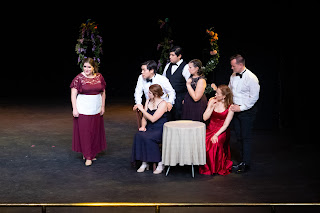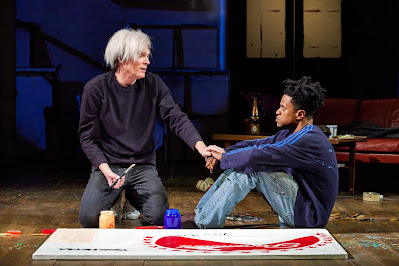By Harry Forbes
This is VHRP Artistic Director Alyce Mott’s fourth go-round with Victor Herbert’s popular musical comedy -- originally a vehicle for the great vaudeville team of Montgomery & Stone -- and why not? It is, after all, the longest running of all Herbert’s shows. It ran for an impressive 318 performances back in 1906, and the 1945 revival ran even longer tallying 531 performances.
.jpg)
Even now, it’s still mightily entertaining, with showstoppers like “The Streets of New York” and “Every Day is Ladies’ Day with Me” as potent as ever.
Mott’s version is a streamlined one. At the late Dino Anagnost’s Little Orchestra Society production (2007), it was basically a concert version with narration; Light Opera of New York’s expanded that edition in 2010; and her two with VHRP (the last in 2017 and now this) showed further refinements. Unlike the last, this one has orchestral accompaniment, a huge plus. Seven fine instrumentalists, including the superb William Hicks on piano, played a stylish reduction of the original orchestrations under the commanding leadership of the company’s musical director Michael Thomas. The tuneful overture set the apt period spirit, and was all the more charming for its chamber-like quality.

Mott’s libretto makes concessions to modern sensibilities and the size of the company, 16 in all. As before, the characters of soubrette Tina and innkeeper Willem are gone. Tina’s songs were delivered by the romantic lead Gretchen (Sarah Caldwell Smith, repeating her 2017 role) and Berta (formerly Bertha), Gretchen’s aunt (Alexa Devlin).
The basic storyline remained intact. The setting is Holland. Gretchen loves sailor Dori (originally called Doris)(Andrew Klima), but her father, the Burgomaster (solid David Seatter, a VHRP founding artist) insists on an advantageous marriage to the Governor of Zeeland (Colin Safley). Two penniless Americans, Con Kidder (Vince Gover) and Kid Conner (Andrew Buck), assisted by Berta, try to assist the lovers, especially after Gretchen is locked in the eponymous mill and Dori is tossed into jail by the Burgomaster. Eventually, the comic duo saves the day by impersonating Sherlock Holmes and Dr. Watson. An auto accident involving a French noblewoman (impressively authentic Sarah Bleasdale) and a British solicitor (well cast Jonathan Fox Powers) add a bit more subplot.

The plot machinations are pretty silly, even in this condensed form, but musically, the show offers one catchy tune after another without a weak link. Some songs lost a verse or two, and a couple were missing altogether, but only real buffs would notice, and it was still a satisfyingly full evening of music which generated warm audience response throughout.
I couldn't help but recall late Herbert champion Frederick Roffman’s memorable production which not only included every number of the published score, but also cut ones like Willem’s “I Ring the Bell,” and even a couple of rare interpolations from other works. For all of Roffman’s genuine scholarship, he was no purist and employed a revised script with some new lyrics and, like Mott, changed the order of the songs, and distribution among characters to suit those revisions.
In Mott’s rewrite, the female characters are given more agency than previously, and the male side suffers a bit. Dori, ostensibly the romantic hero, is fairly ineffectual. But Klima’s vocals were ringingly strong and impressive.
Devlin’s rich vocals, incisive diction, and dramatic prowess were impressively on display. She set the evening’s tone with her authoritative delivery of the opening “Legend of Mill,” originally a second act number, but then reprised it in the second act anyway. She also duetted delightfully with Smith on the rarely done “I’m Always Doing Something I Don’t Want to Do.” But it’s a pity “A Widow Has Ways” has been cut, as she would no doubt have sung it superbly.

The VHRP audience may not have been exactly "convulsed with laughter " as the 1906 audiences were said to have been by Montgomery and Stone, but Gover and Buck were likable and amusing as the comic leads, and their joyous “Streets of New York” number was infectiously performed (in tandem with Smith and Klima). The show-stopping “Good-a-Bye John,” a huge hit in the original production, was missing, perhaps as much for today’s ethnic sensitivities as for its complicated authorship. Herbert was virtually duped into writing the tune hummed to him by Montgomery & Stone, who wanted another number “similar” to something they had done before. The team didn’t reveal to Herbert that what they were quoting to him was, in fact, an existing piece.

Smith, pretty in pink, sweetly vocalized the score’s famous “Moonbeams,” pairing nicely with Klima there and elsewhere.

Safley, a much younger Governor than usually the case, delivered his “Every Day is Ladies Day” entrance number with firm voice and great panache, while Alonso Jordan Lopez, Justin Chandler Baptista, and Keith Broughton camped it up jovially as the “ladies.” Safley's subsequent duet with Devlin was another highlight.

Veterans David Seatter and tenor John Nelson as sheriff Franz -- each with impressive and lengthy operetta credits in their CVs -- strutted across the stage like the seasoned pros they are in a delightful vaudeville turn for “You Never Can Tell About a Woman.”

The ensemble of six (Sophie Thompson, Paige Cutrona, and Annie Heartney along with Lopez, Baptista, and Broughton) were an invaluable asset throughout, providing strong choral support, while playing the inn’s artists and models and other characters along the way.
Mott directed her cast very capably, and this production was, in fact, her best staged of the three productions VHRP has done at its new larger venue. Christine Hall devised some cute choreography for the numbers that required it such as “Always Go While the Goin’ is Good.”

Back in 1906, the New York Dramatic Mirror In its review declared, "there is nothing dull about it, not a moment when the audience shows weariness, not a song or a tune that will not bear repetition…it is a steady, satisfying work. "

As delightfully shown by VHRP’s small-scale but accomplished revival 117 years later, that assessment still holds resoundingly true..
Coming up next: an expanded version of Herbert’s very rare ‘Cyrano de Bergerac” (April 25-27).
(The Theater at St. Jeans, 170 E. 76th Street; www.vhrplive.org; February 21-23)
Production photos by Jill DeVine
Archival photos from the Collection of John Guidinger
(Top to bottom)
"Whistle It" with Andrew Buck (Kid), Sarah Caldwell Smith (Gretchen), Vince Gover (Con)
David C. Montgomery and Fred A. Stone
The New Victor Herbert Orchestra and Maestro Michael Thomas, 2nd from bottom on the Left
Scene from “The Red Mill” 1906
"The Legend of the Mill" related by Alexa Devlin (jBerta) to the Villagers
"The Streets of New York" with Andrew Buck (Kid) & Sarah Caldwell Smith (Gretchen); Andrew Klima (Dori) and Vince Glover (Con)
Andrew Klima (Dori) surprises Sarah Caldwell Smith (Gretchen) with his return
"Everyday Is Ladies Day With Me" with L-R: Keith Broughton, Colin Safley as Governor, Alonso Jordan Lopez, Justin Chandler Baptista
"You Never Can Tell About A Woman" with L-R: David Seatter as the Burgomaster and John Nelson as the Sherriff
The Company



.jpg)





